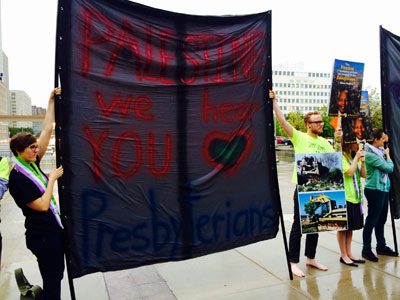
|
| Protesters lined up inside Cobo Hall. Presbyterian Church USA is the largest Presbyterian denomination in the country. PHOTOS:TAAN Natasha Dado |
DETROIT — On Friday, June 20 the Presbyterian Church U.S.A passed a resolution to divest from companies that do business with Israel. The group’s General Assembly voted 310-303 to pass the measure.
The vote comes after a demonstration was held outside Cobo Hall Wednesday encouraging Presbyterian Church U.S.A to divest from the companies, and shows the Palestinian cause is gaining momentum in other communities.
Presbyterian Church U.S.A is the largest Presbyterian denomination in the country. The demonstration was entitled “From Detroit to Palestine.” A majority of the demonstrators were Jewish and Christian activists. The interfaith-led effort also included Muslims and others from various faith based communities.
Demonstrators held up signs featuring the face of the late former South African President Nelson Mandela and a quote from him that read, “Our freedom is incomplete without the freedom of the Palestinians.” Other signs showed pictures of the demolition of Palestinian homes for Israeli settlements. One banner read, “Young Presbyterians, Palestinians and Jews Working Together for Justice.”
The event took place during the Presbyterian Church USA’s biennial convention, which started June 14 and ends June 21. A similar resolution asking the church to place sanctions on companies that do business with Israel almost passed at the group’s last convention in Pittsburgh, but was defeated when it fell short by two votes.
“I think support from the Jewish community in particular is the main key for the whole divestment and for the whole Palestinian occupation as well,” said Mohamed El-Bakri, a demonstrator at the rally. “I think having support from people in different communities is key, because before it is a Palestinian issue it is a human rights issue.”
Local and national leaders in the Jewish community are concerned that the group’s decision could pave the way for other Christian denominations to pursue similar measures.
“One thing that is important to remember is that this effort is about looking towards justice, human rights and equality and those are also Jewish values,” said Sue Chandler, a member of the Presbyterian Church. “I think the Jewish community has no reason to be fearful of this if they look at it in its entirety.

The occupation is ugly, it is cruel, it is a police state and very few people in any religious community could say they support that. This is an effort to symbolically say we don’t support this. I suspect most Jews don’t, either. I think there are some efforts by leaders in the Jewish community to make it sound like it is some hateful thing and it isn’t.”

The occupation is ugly, it is cruel, it is a police state and very few people in any religious community could say they support that. This is an effort to symbolically say we don’t support this. I suspect most Jews don’t, either. I think there are some efforts by leaders in the Jewish community to make it sound like it is some hateful thing and it isn’t.”
Rabbi Alissa Wise, who is a member of the group Jewish Voice for Peace, dressed in a black T-shirt that read, “Another Jew Supporting divestment.” Several demonstrators wore T-shirts bearing that statement.
Wise has received criticism for advocating on behalf of Palestinian rights.
“I definitely have had my share of hate mail over the years,” she said.
There is a divide in the Jewish community over the issue, but Wise said there are efforts being made to try and bridge the gap.
“My understanding about Jewish tradition is that there is a clear teaching about social justice and caring for others, standing against oppression of all types and so for me, it comes out of my Jewish faith,” she said.
Jean White, a member of the Presbyterian Church, said people are often labeled anti-Semitic for speaking out against Israeli settlements and supporting Palestinians.
“That is just rhetoric to make the people who are being honest feel badly and maybe to get them to step back,” she said.
White and Chandler visited both Israel and Palestine this year, and say the trip made them even more passionate about the Palestinian cause.
White said that during committee meetings on Monday and Tuesday Jews and Christians prayed silently together and sang afterwards.

|
| Demonstrators hold up a sign that reads, “Palestine we hear you, Presbyterians.” |
“It was a beautiful thing to be part of,” she said.
The Simon Wiesenthal Center, one of the largest Jewish human rights organizations, urged the rank and file of the U.S. Presbyterian Church (PCUSA) flocking to Detroit for the national meeting to denounce both the leadership’s embrace of its position on the issue and a report that called Israel racist and illegal.
“We are severing all dialogue with PCUSA, because of a pattern of malicious behavior on the part of church administration,” said Rabbi Abraham Cooper, associate dean of the Center, pointing to Zionism Unsettled, a 74-page document released in December and sold on PCUSA’s website. “This demonization of an entire nation and its supporters around the world is an outrage that makes further conversation with this church impossible.
Earlier this week, Rabbi Joseph Krakoff, head of the Southfield-based synagogue Congregation Shaarey Zedek, said the issue is between Israelis and Palestinians to resolve and that the Presbyterian Church’s intervention would cause more harm than good.
“All I can say is that I am hopeful that in addition to Presbyterians who seem to be taking bold leadership within their congregation, there are other people of faiths. There is an interfaith group that is really supporting them in this,” said Randy Block, a member of the Michigan Unitarian Universalist Social Justice Network.






Leave a Reply